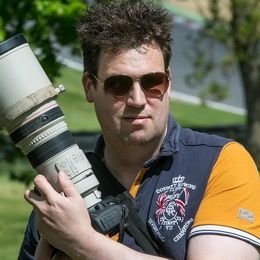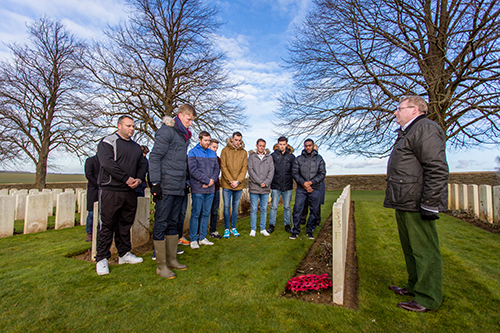Corinthian Casuals Commemorate and Honour Their Fallen Players of the First World War
28/03/2018 - 4.49
Stuart Tree
 On a cold Sunday on January 17th, 2016, Corinthian-Casuals travelled to France to commemorate and honour those players the club lost 100 years ago, in the Battle of the Somme.
On a cold Sunday on January 17th, 2016, Corinthian-Casuals travelled to France to commemorate and honour those players the club lost 100 years ago, in the Battle of the Somme.
In the early part of the 20th century, the Corinthians were famous for taking football around the globe. Pioneers of the game, they travelled to all four corners of the globe, showcasing the beautiful game for all to see and enjoy. Corinthians toured South Africa in 1897 and 1903 and also visited Canada and the U.S. The team continued to dazzle on the field; they beat Belgium 12-0, Netherlands 2-0 and New York City 18-0.
In 1910, the team embarked on a tour of Brazil after an invitation from the man regarded as the founding father of Brazilian football: Charles Miller. Miller had played both for and against Corinthians during his time in England. Corinthians finished the tour unbeaten and defeated, among others, a Brazilian select side and Miller’s Sao Paulo Athletic Club. Watching the latter game were Anselmo Correa, Antonio Pereira, Carlos Silva, Joaquim Ambrosio and Raphael Perrone - five Sao Paulo industrial workers who would, soon after, meet under a gas lamp in the neighbourhood of Bom Retiro and decide to form S.C. Corinthians Paulista – now two-time World Club Champions and boasts over 30 million fans.The original Corinthians returned to Brazil in 1913, but it was another trip to the country in 1914 that remains perhaps the most poignant episode in the club’s history. The 1914 tour is not as well remembered as the 1910 visit, and for good reason - the Corinthians squad returned to England without kicking a ball. On the way to Brazil, the start of World War I was declared, and the team, many of whom were army officer reservists, headed home to fight for their country.
Sadly, the trip across an Atlantic Ocean bristling with U-boats and torpedo fire was to prove the least hazardous part of the war years for these players. Only one of the 14 players who travelled to Brazil would play for the club again, and in total, Corinthians lost 22 men during the war. The names of the dead are now engraved on a war memorial in the club’s boardroom.
One of the greatest Corinthians was Thomas Rowlandson, who made his debut in 1903 and kept goal for the club 150 times, until the summer of 1910. His greatest moment is perhaps standing aside to let the opposition score a penalty in South Africa in 1907, as he refused to accept that intentional foul play could exist in football - perhaps the best-known example of the “Corinthians Spirit” of fair play. He was killed at the Battle of the Somme on September 15th, 1916.
"I have always thought him the finest type of Englishman I have ever known, and his death was just as fine as his life. He died where, of all places, I think he would have chosen... at the head of his men," a fellow officer wrote. Rowlandson was awarded the Military Cross in October 1916 – a medal just two below the highest honour of the Victoria Cross.

(Pictured: Players and officials from the Corinthian Casuals lay a wreath at former goalkeeper Reginald Roger’s grave in The Somme)
Current club Chairman, Brian Vandervilt laid a wreath emblazoned with the Corinthians crest at the grave of Rowlandson, who lay at rest in Becourt Military Cemetery, located just outside the small village of Becordel-Becourt. For Vandervilt, laying a wreath at the grave of Thomas Rowlandson proved to be an emotional experience.
"This man was a national hero," he said. "He was the epitome of the Corinthian spirit, the famous goalkeeper who used to stand aside for penalties, he toured the world with the club and donated his house to the Red Cross before coming here...I’m proud to be here today, these were amazing young men, we’re all proud to remember what they did for not just us, but the entire country."
Mark Smith, our well-versed guide and war historian for the BBC explained that the memorials and burial plots of soldiers were located close to where they fell. In Rowlandson’s case, he died a few kilometres from the front line, indicating that he was wounded on the battlefields and taken to Becourt which was the site of an advanced dressing station, where he would have been tended to before passing away.
Rowlandson lays to rest with 712 other soldiers in what is tragically one of the smaller cemeteries across the Somme region.
Although a few miles down the road, in an extraordinary coincidence, the goalkeeper who replaced him on the 1910 tour, Reginald Rodgers was also killed in action. Second Lieutenant Rogers of the Rifle Brigade, who also kept goal for Oxford fell here. The road out of Mailly-Maillet to Serre and Puisieux entered No Man’s Land about 1,300 metres south-west of Serre. On 1st July, 1916, the 31st and 4th Divisions attacked north and south of this road and although parties of the 31st Division reached Serre, the attack failed. Rogers was killed and now lays at rest with 7,126 other souls in the Serre Road Cemetery No. 2.
In a fitting tribute, current goalkeeper Danny Bracken, who has over 180 consecutive appearances to his name and for that fact alone, can be regarded as one of the greatest goalkeepers to play for the club, lay a wreath and bowed in tribute to his departed predecessor.
Fittingly, Mark Smith relayed the powerful words of Laurence Binyon’s famous poem, 'For the Fallen' as the players and officials of Corinthian-Casuals bowed graciously in remembrance. The words were chilling yet peaceful. "They shall grow not old, as we that are left grow old: Age shall not weary them, nor the years condemn. At the going down of the sun and in the morning. We will remember them."
Amongst others that fell on the battlefields of World War One included Cuthbert Brisley, at the time considered by many the best centre-forward in Europe. He scored 64 goals in 86 games for the club and had been one of the scorers against the Brazilian select side in 1910. After joining the RAF when war broke out and training as a pilot, he was killed in a training accident on July 30th, 1918.
Then there was John Charles Dodsworth Tetley, a cultured defender. Another veteran of the 1910 tour, he managed to play one last time for Corinthians after returning from Brazil, in a charity game against an army team - a day when weather conditions were so bad the ground became a swamp. He was killed in action at the Battle of Passchendaele on October 9th, 1917. The only belongings he left behind were a damaged watch and cigarette case.
Interestingly, the referee in the game against the army was Charles Wreford Brown, another Corinthians great, who was credited with coining the term “soccer” while he was at Oxford.
The list of the dead goes on. There was defender Frank Noel Tuff, who was injured at the Battle of Gallipoli on October 23rd, 1915 and died two weeks later. There was Lancelot Andrewes Vidal, who also played on the 1910 team and scored four times against Fluminense. A machine-gun officer, he was killed by a bombshell on the morning of September 25th, 1915, while leading an offensive against enemy lines.
Our guide engrossed all with sorry tales of the brutality of war. Players were visibly moved and the realisation that the Corinthians, amongst the unfathomable numbers of those killed in the war were the same age or younger than them. Rowlandson was 36, Rogers was 33 - they were the older ones. Boys as young as sixteen and seventeen were involved and many did not return home.
In January 2015, Corinthian-Casuals returned to Sao Paulo, Brazil to finish what the touring party had intended to do – play their namesakes, Corinthians Paulista. The match was played out in front of 30,000 fans at Arena Corinthians – the venue of the opening game of the 2014 World Cup. The amateurs didn’t disgrace themselves or their forefathers. They held out at 0-0 for 78 minutes before a cruelly deflected shot beat Bracken at the near post before adding two more goals in the last few minutes.
In a touch of class, Corinthians Paulista’s shirts bore the names of the original touring party of 1914 and not their own. Brisley, Rowlandson, Tuff and Rogers finally got to tread the hallowed turf of Corinthians 100 years after their scheduled appearance.
"It meant everything to return to Brazil, 100 years after the tour that never happened in 1914," said Chris Watney, former player and now Executive Committee member, who is currently filming a documentary about the whole story.
"That team contained some of the most outstanding players in the world at the time, and they inspired millions with their wonderful football. We may no longer be the greatest team in the world, but we are proud to keep their traditions alive, and we’re delighted S.C. Corinthians Paulista have kept the Corinthian name alive at the top of world football.
"This will be our tribute to that golden generation, to celebrate the Corinthian family around the world that they inspired all those years ago, before dying tragically, fighting for our freedom, on the battlefields of World War I."
Corinthian-Casuals lost upwards of 70 men in the conflict, more than any other club during World War One.
The trip completed the teams journey, an emotional return to where the Corinthians of yesteryear made the ultimate sacrifice.
Biography
Stuart Tree has been following Corinthian-Casuals Football Club for 20 years and currently holds multiple roles in the club including programme editor, press officer, social media and photographer as well as being a member of the committee. His passion for both football and photography has taken him around the world with images published in media from the UK, Europe and as far afield as South America.


/prod01/wlvacuk/media/departments/digital-content-and-communications/images-18-19/iStock-163641275.jpg)
/prod01/wlvacuk/media/departments/digital-content-and-communications/images-2024/250630-SciFest-1-group-photo-resized-800x450.png)
/prod01/wlvacuk/media/departments/digital-content-and-communications/images/stock-images/WLV-email-header-banner---City-courtyard---Opportunity-teaser.png)
/prod01/wlvacuk/media/departments/digital-content-and-communications/images-2024/AUC.jpg)
/prod01/wlvacuk/media/departments/digital-content-and-communications/submitted-news-images/Smelting-knife.png)
/prod01/wlvacuk/media/departments/digital-content-and-communications/submitted-news-images/Uni-1.jpg)
/prod01/wlvacuk/media/departments/digital-content-and-communications/submitted-news-images/SMG-Canal-view.jpg)